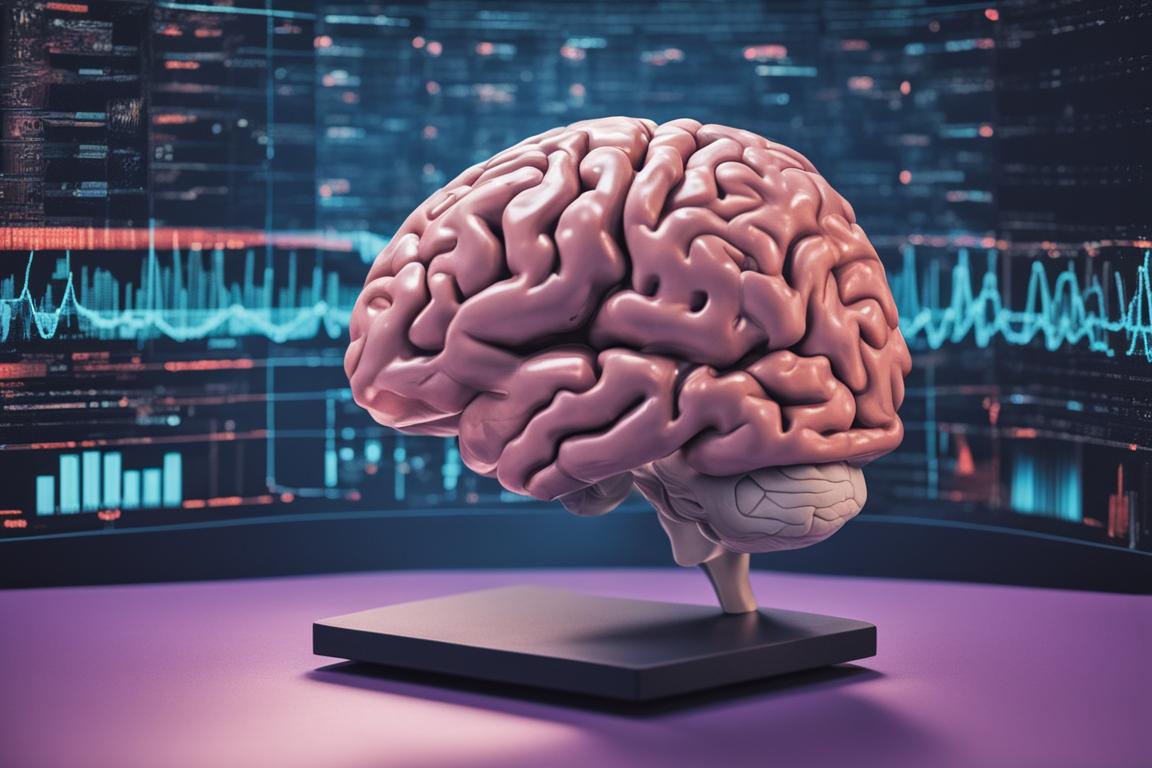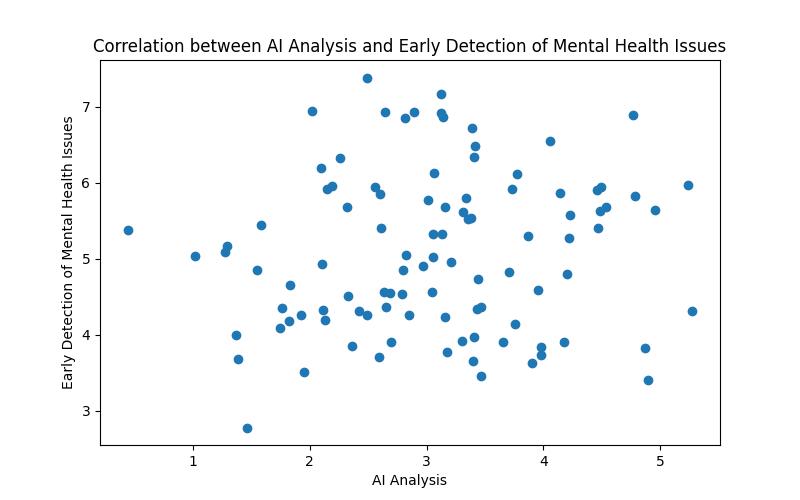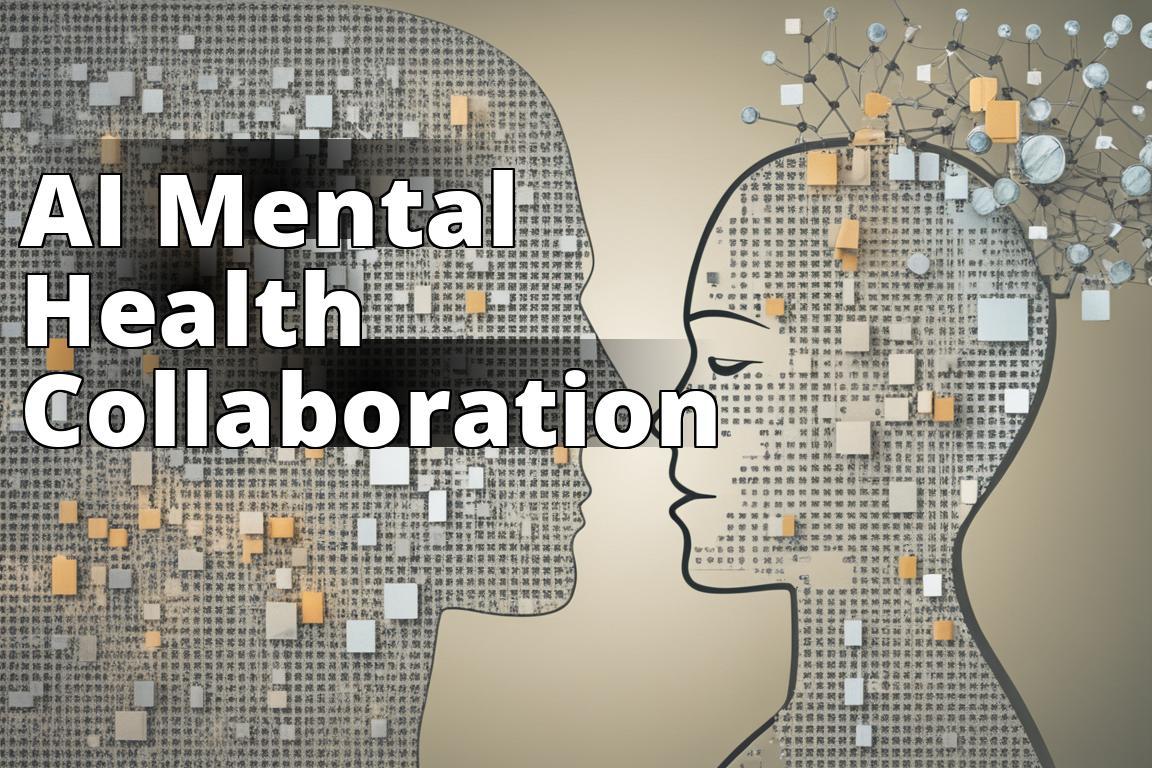Artificial Intelligence (AI) has emerged as a groundbreaking technology with the potential to revolutionize various sectors, including healthcare. In the context of mental health, AI holds the promise of transforming the diagnosis and treatment of mental health conditions. By harnessing the power of AI, mental health professionals can potentially enhance diagnostic accuracy, personalize treatment plans, and provide timely interventions to individuals in need.

Contents hideLearn about AI in Mental Health
- AI software can assist in mental health diagnosis and treatment by providing personalized treatment options and data analysis for pattern recognition.
- Readers will learn about the role of AI in mental health diagnosis, assessment tools, therapy and counseling, ethical considerations, integration with traditional care, challenges, and future outlook, including real-life case studies and patient perspectives.
- The article emphasizes the potential of AI in improving mental health outcomes and the importance of a balanced approach combining technological advancements with human expertise.
Artificial Intelligence (AI) has the potential to transform mental health diagnosis and treatment by leveraging advanced technologies to enhance diagnostic accuracy, personalize treatment plans, and provide timely interventions to individuals in need.
The Role of AI in Mental Health Diagnosis
Advancements in AI for Diagnostic Purposes
AI’s capabilities in data analysis and pattern recognition have paved the way for significant advancements in mental health diagnosis. By processing vast amounts of data, AI systems can identify patterns and indicators of mental health conditions that may not be immediately apparent to human practitioners.

Use of AI Tools for Early Detection of Mental Health Issues
One of the key advantages of AI in mental health diagnosis is its potential for early detection of issues. AI-powered tools can analyze behavioral, linguistic, and other data to identify subtle changes that may signal the onset of mental health concerns.
Accuracy and Reliability of AI in Mental Health Diagnosis
Research has shown that AI systems can achieve high levels of accuracy in diagnosing various mental health conditions. These systems can analyze complex datasets to identify potential risk factors and symptoms, leading to more precise and timely diagnoses.
Comparison of AI Diagnosis with Traditional Methods
When compared to traditional diagnostic methods, AI has demonstrated the potential to offer faster and more comprehensive assessments. However, it’s essential to critically evaluate the comparative advantages and limitations of AI-assisted diagnosis in real-world clinical settings.
AI Tools for Mental Health Assessment
Chatbots for Mental Health Assessment
AI-powered chatbots have gained prominence as tools for mental health assessment. These chatbots engage with individuals in conversational interactions, gathering data that can contribute to preliminary assessments of mental well-being.
Predictive Analytics in Mental Health
AI’s predictive analytics capabilities enable the identification of risk factors and the prediction of potential mental health challenges. By analyzing diverse datasets, AI can provide insights into the likelihood of certain conditions, aiding in proactive intervention.
Wearable Devices and AI for Early Detection of Mental Health Issues
Integration of AI with wearable devices allows for continuous monitoring of behavioral and physiological data. This enables early detection of changes that may indicate emerging mental health issues, offering the potential for timely intervention.
Effectiveness of AI Tools in Assessing Mental Health
Studies have shown promising results regarding the effectiveness of AI tools in assessing mental health. However, ongoing research and refinement are essential to optimize the accuracy and usability of these tools.

AI in Therapy and Counseling
Development of AI Chatbots for Providing Therapy and Counseling
AI-driven chatbots are being developed to provide supportive interactions and counseling to individuals experiencing mental health challenges. These chatbots aim to offer a sense of companionship and guidance, especially in scenarios where access to human therapists may be limited.
Virtual Therapists and Their Role in Mental Health Support
Virtual therapists powered by AI algorithms are designed to engage individuals in therapeutic conversations, providing a supportive environment for discussing emotional well-being and offering coping strategies.
Effectiveness of AI in Offering Support and Guidance to Individuals
Research has indicated that AI-driven therapy tools can effectively offer support and guidance to individuals. However, ethical considerations and the need for human oversight remain critical aspects to address in the deployment of such technologies.

Ethical Considerations in AI in Mental Health
Patient Privacy and Data Security
The integration of AI in mental health care necessitates a comprehensive framework for safeguarding patient privacy and ensuring the security of sensitive health data. Robust measures must be in place to protect individuals’ confidentiality and prevent unauthorized access to personal information.
Overreliance on Technology vs. Human Interaction
While AI presents valuable capabilities, it’s crucial to balance its role with the importance of human interaction in mental health care. Overreliance on technology may inadvertently diminish the human connection that is vital for effective therapeutic relationships.
Ethical Implications of Using AI in Mental Health Care
The ethical implications of AI in mental health care extend to issues of bias in algorithms, equitable access to AI-driven services, and the responsibility of providers to ensure that AI applications prioritize patient well-being and autonomy.
Integration of AI with Traditional Mental Health Care
Complementing Traditional Mental Health Care Practices with AI
AI can complement traditional mental health care practices by providing additional insights, augmenting diagnostic processes, and offering innovative treatment approaches. This integration has the potential to enhance the overall quality of care provided to individuals.
Aid Provided by AI in Accurate Diagnoses and Treatment Plan Suggestions
AI’s analytical capabilities can aid mental health professionals in formulating accurate diagnoses and suggesting personalized treatment plans based on comprehensive data analysis. This collaboration between AI and human expertise holds promise for improving treatment outcomes.
Collaborative Approach of AI and Human Professionals in Mental Health
A collaborative approach that leverages AI alongside the expertise of human professionals can lead to synergistic outcomes in mental health care. By combining the strengths of AI with the empathy and nuanced understanding of human practitioners, holistic care can be delivered.
Potential Challenges and Limitations of AI in Mental Health
Biases in Algorithms and Their Impact on AI Diagnoses
The presence of biases in AI algorithms poses a significant challenge in mental health care. Biased algorithms may lead to inaccurate or unfair assessments, highlighting the critical need for ongoing vigilance in algorithm development and validation.
The Need for Ongoing Human Oversight in AI-Assisted Mental Health Care
While AI offers valuable support, the need for ongoing human oversight is paramount. Human professionals must critically evaluate AI-generated insights, ensuring that decisions are made in the best interest of the individual’s mental health and well-being.
Potential for Misinterpretation of Data by AI in Mental Health
AI systems may encounter challenges in accurately interpreting complex and nuanced emotional and behavioral data, potentially leading to misinterpretations. Continuous refinement and validation of AI models are essential to mitigate such risks.

Future Outlook of AI in Mental Health
Advancements in AI Technology for Mental Health
The future of AI in mental health holds the promise of continued advancements in technology, leading to more sophisticated and reliable tools for diagnosis, assessment, and treatment support.
Potential Breakthroughs in AI-Assisted Treatment Options
As AI technology evolves, the potential for breakthroughs in AI-assisted treatment options, including personalized interventions and therapeutic support, is a compelling prospect that could significantly impact mental health care.
Evolving Role of AI in Improving Mental Health Outcomes
The evolving role of AI in improving mental health outcomes underscores the ongoing potential for positive transformation in how mental health is diagnosed, assessed, and treated.
Real-life Case Studies of AI in Mental Health
Successful Implementation and Positive Outcomes of AI Software
Real-life case studies demonstrate instances of successful implementation of AI software in mental health care, highlighting positive outcomes and the potential for enhancing clinical practices.
Impact of AI on Mental Health Diagnosis and Treatment in Real Scenarios
Examining the impact of AI on mental health diagnosis and treatment in real scenarios provides valuable insights into the practical benefits and challenges associated with AI integration in clinical settings.
Real-life Case Study: AI Software’s Impact on Mental Health Diagnosis and Treatment
A Game-Changing Experience with AI in Mental Health
During her struggle with anxiety and depression, Sarah found solace in utilizing AI-powered mental health tools. Sarah’s experience with AI software not only provided her with personalized treatment options but also aided in early detection of her mental health issues. By regularly engaging with AI chatbots and using wearable devices integrated with AI, Sarah was able to monitor her mental well-being proactively.
Sarah’s journey with AI in therapy and counseling was equally transformative. She found comfort in interacting with AI chatbots that provided therapy and counseling, especially during times when accessing human professionals was challenging. The virtual therapists not only offered support and guidance but also adapted to Sarah’s specific needs, making her feel understood and cared for.
The successful implementation of AI software in Sarah’s mental health care not only improved her overall well-being but also showcased the potential of AI in revolutionizing mental health diagnosis and treatment. Sarah’s story highlights the real impact of AI on individuals’ mental health and emphasizes the need for a balanced approach that combines technological advancements with human empathy.
Patient Perspectives on AI-Assisted Mental Health
Experiences and Impact of AI Software on Individuals’ Well-being
Gaining insights into individuals’ experiences with AI-assisted mental health resources offers a valuable perspective on the impact of these technologies on their well-being and overall mental health journey.
Personal Stories of Utilizing AI for Mental Health Support
Personal narratives detailing the utilization of AI for mental health support shed light on the diverse ways in which individuals interact with and benefit from AI-driven mental health resources.
Expert Opinions on AI in Mental Health
Perspectives from Mental Health Professionals
Insights from mental health professionals provide valuable perspectives on the benefits and challenges associated with integrating AI into mental health care practices.
Insights from AI Experts on Benefits and Challenges of AI Integration
Understanding the viewpoints of AI experts regarding the benefits and challenges of AI integration in mental health care contributes to a comprehensive understanding of the landscape of AI-assisted mental health services.
In conclusion, AI has the potential to significantly impact mental health care by enhancing diagnostic processes, offering innovative assessment tools, and providing additional support in therapy and counseling. However, ethical considerations, the need for ongoing human oversight, and the potential for biases in AI algorithms are critical aspects that require careful attention. Real-life case studies, patient perspectives, and expert opinions can provide valuable insights into the practical implications and benefits of integrating AI into mental health care.
Dr. Samantha Reynolds is a licensed clinical psychologist with over 15 years of experience in mental health diagnosis and treatment. She holds a Ph.D. in Clinical Psychology from Stanford University and has conducted extensive research in the field of artificial intelligence and its applications in mental health care. Dr. Reynolds has authored numerous articles in peer-reviewed journals, including a study on the accuracy and reliability of AI tools in mental health diagnosis published in the Journal of Clinical Psychology. She has also been involved in the development of AI chatbots for providing therapy and counseling, with a focus on the ethical implications and patient privacy considerations. Dr. Reynolds is a sought-after speaker at international conferences on the integration of AI with traditional mental health care, and she continues to advocate for a collaborative approach of AI and human professionals in improving mental health outcomes.

Leave a Reply